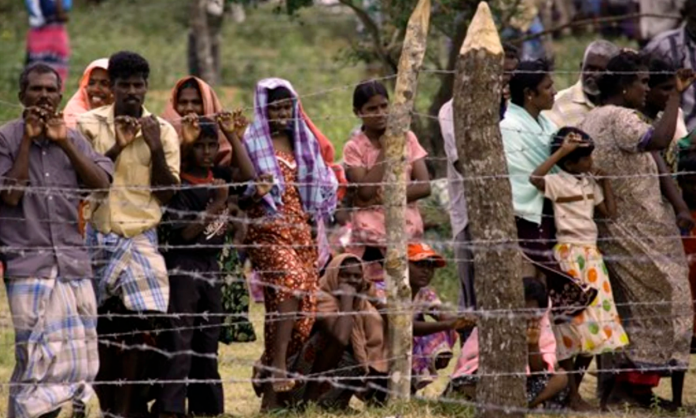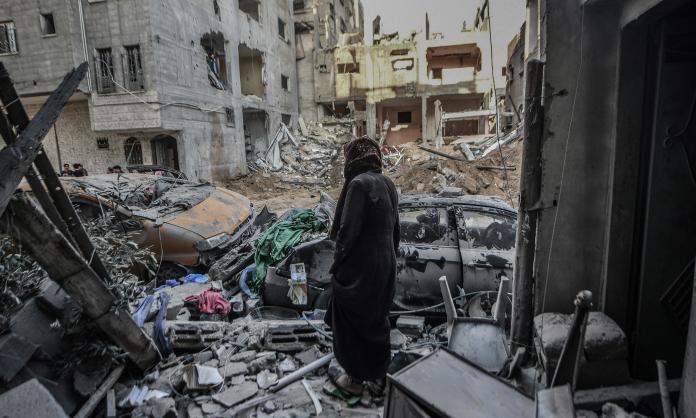Nachshon Amir looks like a military man. It’s decades since he served in the Israeli military, but with his shaved head, fit physique and rugged demeanour, it might also seem that he has just been demobbed.
Today, he’s an activist with Free Palestine Melbourne, which is quite a turnaround from how he lived life in the Middle East.
Raised in a Zionist family, Nachshon says his earliest memories are of growing up believing that Israel was the Jewish homeland as ordained by God, that the separation of Jews from their Palestinian neighbours was normal and just, and that Zionism was as natural as breathing.
“I remember going with my father into the West Bank as a 10-year-old. We stood on a hill with other Israelis shouting, ‘This is our land!’.” Years later—during the First Intifada (1987-93)—Nachshon went back to the West Bank as a member of the occupation forces.
Nachshon did his compulsory national service in a tank regiment but signed up for two extra years as an officer. In his mind, the military was protecting Israel from potentially hostile neighbours, Lebanon and Syria. But he also says that most of the time he was intimidating and subduing Palestinians in Gaza and the West Bank.
He is no longer proud of his time in the military and seems reluctant to talk in much detail about what he did day to day. But he is clear that his role was to discipline the Palestinian population through relentless—and often pointless—intrusions into their villages and homes.
Nachshon tells a story about going to one house and waking the elderly occupants to make them come outside and paint over Arabic graffiti on the wall of their compound.
“I don’t even know what was written, I don’t speak or read Arabic”, he says. “We just made them do it because we could. If we saw a good house on a hill, we would go and kick out the Palestinians and take it over. It would be our base for the next three months.”
There is embarrassment and sadness in Nachshon’s voice. Harassing Palestinians on behalf of the Israeli state was his life. It was all he knew, and it wasn’t something that he questioned at the time.
“I mean, you go to the streets and you go in a village where there’s no Jewish people or traffic, because they’re in the settlements around the area. But you just go there to instigate and just to keep the Palestinians down so they won’t have any thoughts of uprising.”
In this Zionist world view, the Jewish settlers are the “good guys” and the “Arabs”—“we didn’t even call them Palestinian back then”, Nachshon says—are the “bad guys”. The other soldiers were taught to think that each Palestinian kid they encountered could grow up to be a “terrorist”.
A fervent nationalism and sense of superiority permeated every aspect of life. Nachshon believes that the Israeli education system completely locks down people’s minds. This indoctrination is perhaps we’re seeing so many Israeli soldiers broadcasting on TikTok and Instagram their own war crimes—everything from running over children with tanks to blowing shit up for fun and petty thieving.
Nachshon seems puzzled by this type of activity from rank-and-file soldiers. “There’s no-one to stop them”, he says. But he’s also not surprised: “They don’t punish anyone for anything, so nobody has paid a price even for much worse, like killing someone they didn’t have to kill”.
Nobody in Nachshon’s family or circle of friends questioned Zionism or Israeli policy towards the Palestinians. “If you try to tell them it’s apartheid in Israel, they get angry, and say: ‘No, this is a democratic Jewish state’. The perception is: ‘This is our country’. They don’t talk about the other thing. They just put the borders where they want. When you grow up in such an environment, and this is your whole truth, you have no way of knowing anything else. So you want to serve your country and be a hero. Only later did cracks form in my consciousness.”
After leaving the military, Nachshon says he switched off from politics. While doubts about what Israel was doing began to creep in, he put them to the back of his mind for another decade.
“I can’t say I was unaware of the crimes being committed against Palestinians, but I said: ‘I’m not putting my head into politics’”, he says, recounting that he stopped reading the papers, watching the news and voting in elections.
It’s not uncommon for former soldiers to switch off; particularly those with physical and psychological scars from battle: “I hardly remember the Second Intifada (2000-05). I remember it happened, but I didn’t care”.
This is where Nachshon’s story takes a twist. His wife is a medical professional, and in 2009 the family came to Australia for the first time while she pursued work opportunities. It was the multicultural nature of his daughters’ school that first sparked Nachshon’s soul-searching.
“My daughters went to school with Hindus and Christians and all sorts and it’s normal. In Israel, we only have Jewish schools and separate schools for Palestinians.”
In 2014, the family returned to Israel and Nachshon became interested in the plight of North African refugees who had begun turning up in Israel in large numbers. “I saw there were tens of thousands of refugees in Tel Aviv with no rights. With nothing. I didn’t look at it before, but I was shocked at the racism”, he says.
After a long journey, with many detours, Nachshon found himself becoming a social justice activist. This led him to begin questioning the Israeli government he had been loyal to for so long. “I moved to the Palestinian cause.”
The decision cost him dearly. He was socially isolated in his support for Palestine. Nachshon divides his ex-friends into two groups: “the more liberal camp” that thought the West Bank should be Palestinian but who were “not willing to do anything about it”, and the more conservative set who “were committed to the concept of Israel from the river to the sea”.
After 7 October, friends of 30 years began to question Nachshon’s views. Previously, they might have been indifferent, but now “it drives some of them crazy about me”, he says.
“I’m saying the same things now that I said to my friends six years ago, and they said to me: ‘I don’t want to be your friend any more’. They don’t want to hear what I have to say.”
At some point, Nachshon found himself wanting to leave Israel again. The family returned to Australia in January 2019, and he took up the refugee cause here, while also studying the history of his birth country.
“I learned the real history. I discovered that all I knew was false stories, myths that Israeli society tells itself. I learned that the story of Palestine is very similar to what happened in other places around the world.”
Nachshon has joined the dots and now recognises that the colonial system in Israel is similar to the story of South Africa and Australia: “People who came from Europe decided that this land would be theirs at the expense of the local indigenous residents. A structure known as settler colonialism”.
This is how Nachshon now explains the Nakba (catastrophe) of 1948, when Zionist terrorists, helped by the British, pushed the Palestinians off their land in a violent pogrom. “The Zionists wanted a Jewish state in Palestine. And for that, it was necessary to remove the indigenous people from the land. This is precisely what happened during the Nakba in 1948.”
On 26 February, this year, Nachshon spoke at a rally outside Heidelberg Town Hall, organised by the Banyule Palestine Action Group to put pressure on the council to support a ceasefire. Nachshon seemed nervous—perhaps because he was speaking in front of a crowd including about 40 people from the West Heidelberg mosque. Maybe he didn’t know how people would react to someone with his history.
He needn’t have worried. Nachshon got a huge round of applause and, on the finish of the speech, the local imam, Sheikh Alaa, approached and warmly shook Nachshon’s hand.
At that moment, as the two embraced, I realised that it takes more courage to be an Israeli Jew who champions the Palestinian cause than it takes to fire shells into Palestinian homes from the turret of a military tank.







